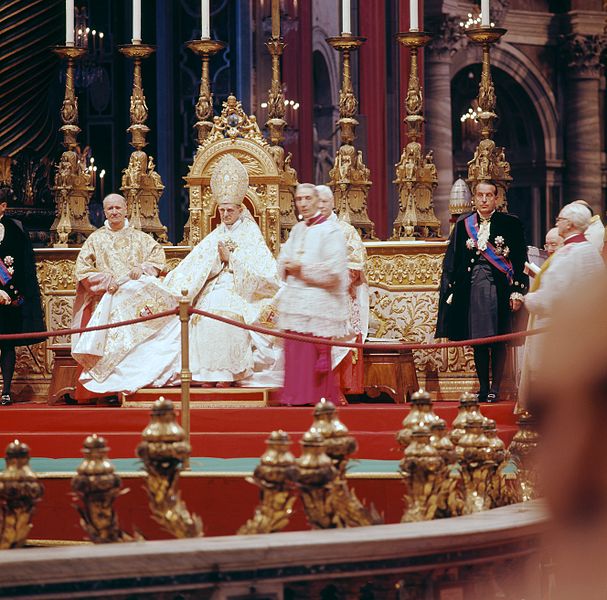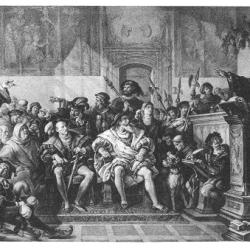Blessed Pope Paul VI during Vatican II; photograph by Lothar Wolleh [Wikimedia Commons / Creative Commons Attribution-Share Alike 3.0 Unported license].
I was challenged by a Catholic friend who took the directives of Vatican II seriously about sharing the faith with separated brethren in a way that they can understand. If I had talked to radical Catholic reactionaries, instead, back in 1990, they would have moaned and groaned about the Church and it would have had zero appeal to me, as I was already quite happy and content as an evangelical Protestant.
While they bashed the Church, my friend loved Vatican II and defended and loved Holy Mother Church. The radical Catholic reactionaries acted like Protestants (i.e., rebelling against the sublime authority of ecumenical councils) or liberal dissidents, and the so-called “neo-conservative” or “neo-Catholic” or “Novus Ordo Catholic” acted like a Catholic (follows the Church, pope, and Councils). It’s, um, called the “magisterium”. I have affinities with traditionalists in many ways, as I have often noted. I have no affinity whatsoever with radical Catholic reactionaries: including their wrongheaded animus against Vatican II.
The first issue I changed my mind about was contraception, and the Church’s prohibition of it was reiterated by the pope who closed Vatican II, Blessed Pope Paul VI in Humanae Vitae in 1968. The other great issue for me was the development of doctrine, after reading Blessed John Henry Cardinal Newman’s essay on that topic. He is considered the “Father of Vatican II” and stressed lay participation and the sensus fidelium. I was a lay missionary then and a lay Catholic apologist now (another emphasis of Vatican II).
My mentor was Servant of God, Fr. John A. Hardon, S. J., who was a close adviser to Blessed Pope Paul VI and also to Blessed Mother Teresa: who was first brought to wide attention by Malcolm Muggeridge (another convert) in his 1971 book, Something Beautiful for God. Muggeridge was one of the few Catholics and apologist-types with whom I was familiar before 1990 (also somewhat with Chesterton). He converted largely due to the contraception issue.
I deny that a bunch of junk “came out of” Vatican II. That’s a false premise. It came from liberalism and the secularizing cultural chaos of the 60s, whereas Vatican II was entirely orthodox and in line with Sacred Tradition. The garbage that happened for 40 or more years after Vatican II (the so-called “spirit of Vatican II”) is not the council’s fault. Nor is it anything new in the history of ecumenical councils.
Most of even the Western bishops (minus the pope) went astray during the 4th century Arian crisis, even though the Council of Nicaea had already settled the question. The East went almost entirely astray, as Newman noted in his Essay on Development. Likewise, we see the wholesale defection of the bishops in England during Henry VIII (though under threat of death). Only St. John Fisher held firm.
G. K. Chesterton noted that the Church has gone to the dogs five times, and in every case, the dog died. It will again in this instance. The theologically liberal / modernist / dissident / heterodox generation will mostly die out in the next 20 years. They had their “fun” and wreaked havoc. Now they will go into the dustbin of history with all the other heretics and schismatics. Fr. Hardon often said that “the worst centuries in history were always followed by centuries of revival.” We’re in that century. Revival is coming, for those who have the eyes of faith to see it.
Radical reactionaries make out that Vatican II is somehow opposed to the Tridentine Mass. But who brought the Tridentine Mass back? Pope St. John Paul II (whom radical Catholic reactionaries despise) first made it more widely available, and then Pope Benedict XVI in a more sweeping way. They are both quintessentially men of Vatican II.
Pope Benedict, the traditionalists’ darling (also the fave of many radical Catholic reactionaries) did not (oddly enough!) take away the Novus Ordo, did he? The reactionaries loved him for making the Old Mass available universally (in theory), but they also like to ignore the fact that he also taught that both Masses were forms of the one Latin / Roman Rite. As usual, it’s an arbitrary pick-and-choose (always the schismatic and heretical tendency). Pope Benedict also taught that Vatican II had precisely the same authority as Trent. If one accepts Trent, they must accept Vatican II on exactly the same basis (extraordinary gathering of bishops presided over by the pope). He stated that in The Ratzinger Report, from 1985. The radical reactionaries love to quote his pre-papal writings; yet they seem to ignore this particular teaching of his.
I wrote about this in a dialogue with people who were giving up on the reform of the reform. They will cite Benedict regarding the Old Mass, from 2007, but when they cite him talking about the New Mass, it’s almost always (to me, comically) drawn from a few over-used (and taken out of context) critical comments, pre-pope.
In the “Benedictine era,” the quasi-schismatic kooks among the radical Catholic reactionaries ratcheted down their extremist rhetoric quite a bit, and many of them became respectable mainstream traditionalists: which is why I am now careful to identify and distinguish two completely different groups. But since his departure, it’s been a trend of “revival” back to the old madness, with fools and nattering nabobs objecting to Pope Francis every time he puts on a pair of socks. So we have the same garbage repeated. Error always acts in the same boorish, tired way.
Hopefully, the worst of them will depart and spread their errors elsewhere (or cease and desist and mind their own souls, which are in grave danger), and we can get back to the business of being Catholics and following Holy Mother Church, minus their endless wrongheaded cackling and bellyaching and creation of divisions, to the devil’s great delight, and minus the irritating, irrational hostility against a straw man that these critics falsely think is the Second Vatican Council.

















